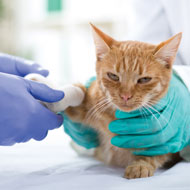Veterinary nurses to receive advanced critical care training

The Sir Hamish McTavish Memorial Fund aims to improve veterinary care for animals.
Veterinary nurses at the Royal (Dick) School of Veterinary Studies will have the opportunity to received advanced training in emergency and critical care, guiding them towards the leading qualification in the field.
Until now there has been no formal programme to help nurses prepare for the Veterinary Technician Specialist (Emergency and Critical Care) certification exam.
The exam can only be taken in the US where the awarding body is based and there are currently fewer than 10 veterinary nurses in the UK with this specialised qualification.
Initially the structured training programme will only be open to nurses practising at the school’s Hospital for Small Animals, but it is hoped it could be rolled out more widely in future.
Nurses will have the opportunity to share their training with others outside of the hospital, with a view to improving critical care nursing across the UK.
The cost of training and certification for up to three nurses will be covered by a scholarship fund supported by the Sir Hamish McTavish Memorial Fund, which aims to improve veterinary care for animals. It was founded by Ken and Emilia Cook in memory of their beloved West Highland white terrier, named Sir Hamish.
Mr Cook said: “We are delighted to be associated with this remarkable milestone in the history of the University of Edinburgh’s Royal (Dick) School of Veterinary Studies Training Programmes. We are certainly aware of the enormous value to be gained in the field of Veterinary, Emergency and Critical Care in the UK and overseas and the need for such a specialty.”



 The BSAVA has opened submissions for the BSAVA Clinical Research Abstracts 2026.
The BSAVA has opened submissions for the BSAVA Clinical Research Abstracts 2026.